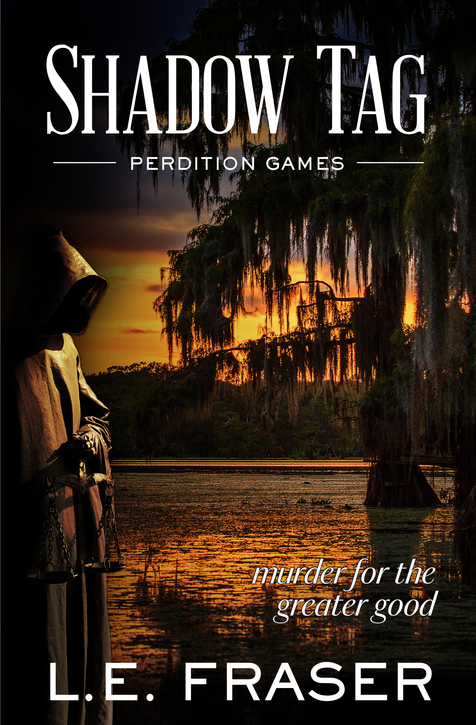The Perdition Games series by L.E. Fraser continues with Shadow Tag, a brutal and unpredictable thriller that will keep readers looking over their shoulder, and questioning the sage advice of their medical professionals. The tangled threads of this plot are brilliantly woven into a web of corruption, cruelty, revenge and perseverance.
Tasked with investigating a sinister crime under the guise of an internship at a psychiatric hospital, Samantha McNamara is dragged back into a dark, cult-filled corner of her own past. Reece Hash, Sam’s fiancee, is simultaneously investigating a string of cases that may have been perpetrated by a serial killer – one looking to cover his tracks, rather than show off his genius.
As a crime-fighting, private investigator duo, Reece and Sam are both pushed to the limit in their search for justice, but this is hardly new for them, but this novel fleshes out their connection, history and individual depth even further. What neither character realizes is that Reece’s psychopathic executioner and Sam’s potentially deluded patient may be linked by a deeper string, one that will put all of their lives in jeopardy.
Flashbacks to a murder in New Orleans a decade earlier add yet another mysterious layer of clues, making it difficult for readers not to play detective right along with the protagonists. As Sam closes in on the perpetrator of Fadiya’s inexplicable pregnancy, and disturbing delusions, Reece faces the potential collapse of his career, unless the murderous judge, jury and executioner can be stopped. Potential suspects become allies, friends sink into the murky realm of uncertainty, and every motive comes into question. Featuring an inexorable tightening of tension from the very start of this thriller, Fraser is truly a masterful puppeteer.
Writing about controversial topics like sexual abuse, human trafficking, abortion, medical corruption and religious manipulation is rarely easy, but Fraser writes with confidence and sensitivity, and avoids using these hot-button themes as mere plot devices. The authenticity of interaction and dialogue is also critical when dealing with mental health, but every character, particularly Fadiya and many of the secondary support characters, feels three-dimensional and believable.
The richness of language also deserves a tip of the cap, as Fraser uses words like a whip, flexing the muscles of her vocabulary to paint visceral scenes and descriptions, without ever being too verbose or showy. Flexibly moving between different characters and perspectives can also be jarring, but the shifts feel organic, clear and well-timed in the story’s progression.
On the technical side, some of the more intense scenes feel rushed, and the physicality of movement can be unclear. Ensuring that your readers can imagine scenes and picture the action is key for an immersive read. Furthermore, some of the exposition and explanations feel heavy-handed or solely included to lead the reader. For example, when multiple clues fall into place and intuitively connect for a revelation, the author doesn’t assume that readers are clever enough to follow the crumbs, making the “Aha” moments occasionally feel spoon-fed.
That being said, the pace of this meticulously penned thriller is consistent, the characters are real enough to touch, the subject matter is timely, and the ultimate twist is one you won’t see coming, for a gripping installment of this entertaining series.
Book Links
STAR RATING
Design
Content
Editing
Get an Editorial Review | Get Amazon Sales & Reviews | Get Edited | Get Beta Readers | Enter the SPR Book Awards | Other Marketing Services
























Leave A Comment